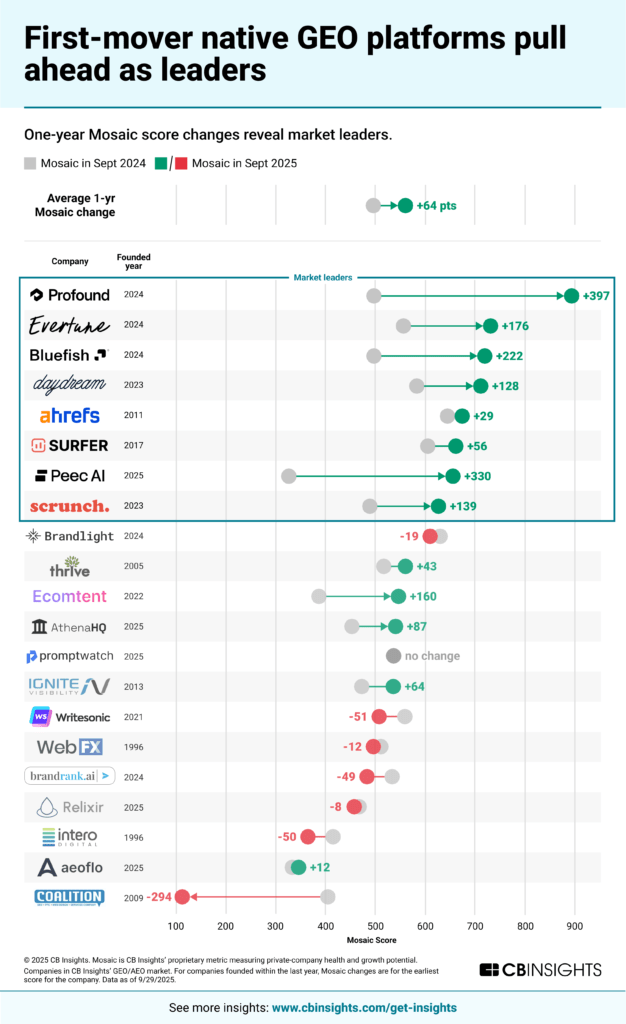AI shopping is here, and brands are entering a new battleground.
OpenAI‘s September 2025 rollout of in-platform checkout via Shopify and Stripe enables shoppers to search, decide, and buy entirely within ChatGPT. Adobe reports that traffic from generative AI platforms to US e-commerce sites surged 4,700% year-over-year in July 2025, and is accelerating every month.
To compete, brands must establish a strong presence in AI search — or risk losing share in the emerging agentic shopping journey. Generative engine optimization (GEO) is the solution: startups in this space are building tools to track, measure, and optimize brand visibility across ChatGPT, Claude, Google AI Overviews, and other AI-generated answers, creating a new SEO arms race.
Using CB Insights’ Mosaic score — which measures private company health and predicts likelihood of success — we analyzed more than 20 GEO companies, ranking them by 1-year Mosaic score growth to identify the fastest-rising vendors. By examining their capabilities and growth signals, this analysis highlights the GEO partners best positioned to help brands win in AI search.
- Native GEO solutions have the first-mover advantage. Of the 8 GEO companies with the most momentum — each posting more than the market’s average 14% Mosaic growth in the past year — 7 were founded between 2023-2025. All but 2 companies with Mosaic scores of 600+ also launched in the same window. These “native” GEO companies were built specifically for LLM visibility rather than retrofitting or bolting onto SEO tools, giving them advantages in data collection, multi-model monitoring, and content recommendations.
- Four capabilities have emerged as table stakes, and vendors without this full stack will fall behind. Analysis of the CB Insights market scorecard for companies with the top Mosaic scores (600+) highlights a consistent feature set: multi-platform monitoring across ChatGPT, Perplexity, Google AI Overviews, and emerging engines; competitive benchmarking that tracks share of voice against rivals; sentiment analysis measuring how brands are portrayed; and actionable insights on content gaps and adjustments. Vendors that deliver this complete capability set are the ones that will lead the market. Buyers should prioritize these features when evaluating potential partners.
- Automated content generation is becoming a differentiator. While most GEO tools diagnose visibility, leaders are building autonomous content engines that create LLM-optimized content. Profound offers AI content workflows using preset templates to write AI-friendly material from aggregated citations. Surfer‘s Content Editor suggests LLM-ready content modifications. Scrunch constructs parallel “AI-friendly” website versions optimized for machine consumption alongside human-facing sites. As GEO evolves, the platforms that can both track and directly shape how LLMs read the web will dictate the rules of agentic discovery. Brands’ demands for the most efficient solutions will force pure-play monitoring tools to build or acquire content capabilities.
For information on reprint rights or other inquiries, please contact reprints@cbinsights.com.
If you aren’t already a client, sign up for a free trial to learn more about our platform.
